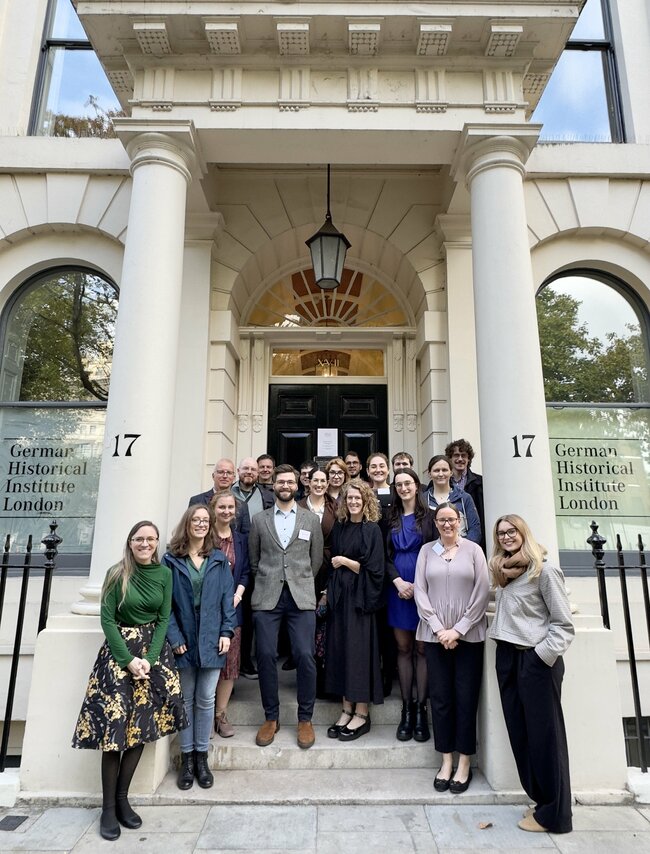 Conference
Conference
Medieval History Seminar 2025
8 – 10 October 2025
Conveners: Fiona Griffiths (Stanford University), Michael Grünbart (Universität Münster), and Simon MacLean (University of St Andrews)
Venue: Swedenborg House
The German Historical Institutes in London and Washington, D.C., are excited to announce the fourteenth Medieval History Seminar, to be held in London from 8 to 10 October 2025. The seminar will bring together Ph.D. candidates and recent Ph.D. recipients (2024/2025) in medieval history from American, Canadian, British, Irish, and German universities for three days of scholarly discussion and collaboration. Participants will have the opportunity to present their work to their peers and distinguished scholars from both sides of the Atlantic. Conveners for the 2025 seminar will be Fiona Griffiths (Stanford University), Michael Grünbart (Universität Münster), and Simon MacLean (University of St Andrews).
The seminar is bi-lingual and papers and discussions will be conducted both in German and English.
Programme
Wednesday 8 October
First panel
Chair: Stephan Bruhn (GHI London)
Michaela Selway (University of Tübingen)
Echoes of Scripture: Biblical Patterning and Theological Insight in the Works of Paul the Deacon
Amos Bronner (The Catholic University of America)
The Participation of the Unfree in Carolingian-era Justice
Comments: Elena Shadrina, Noah Weismüller
Second panel
Chair: Michael Grünbart (University of Münster)
Sarah Schnödewind (University of Münster)
Alles nur erdichtet und zusammengereimt? Zur Bedeutung von Dichtung in hagiographischen Diskursen des 11. und 12. Jahrhunderts
Rosemary C. Williams (University of St Andrews)
The Role of Mary in Dante’s Antepurgatory: An Analysis of Veiled Presence
Comments: Michaela Selway, Bee Jones
Thursday 9 October
Third panel
Chair: Fiona Griffiths (Stanford University)
Nathalie Schmidt (TU Dresden)
Obligatory and Objectionable. The Sick and the Women in the Order of Saint Anthony
Carolin Schreckenberg (Paderborn University)
Homo debilis, femina debilis? Genderspezifische Auffassung und Darstellung “behinderter” Frauen und Männer im 11. bis 14. Jahrhundert
Comments: Amos Bronner, Christina Becker
Fourth panel
Chair: Simon MacLean (University of St Andrews)
Christina Möller (University of Gießen)
Königliche Autorität und regionale Kräfte. Die Wettiner und das Königtum unter Rudolf I., Adolf von Nassau und Albrecht I. im mitteldeutschen Raum
Johannes Beul (University of Mainz)
Der Krieg der Fürsten und das Leiden der Mönche und der Bauern. Wahrnehmung von Kriegsfolgen und Konzeptualisierung von Akteuren und Betroffenen militärischer Konflikte in stauferzeitlichen Quellen
Comments: Robin Wheeler, Derek R. Benson
Fifth panel
Chair: Thomas Kaal (DHI London)
Bee Jones (Jesus College Oxford)
Bernard’s Barbarians. Bernard of Clairvaux, Máel Máedóc of Armagh, and Discourses of Barbarism in Central Medieval Latin Europe
Comments: Rosemary C. Willams, Nathalie Schmidt
Sixth panel
Chair: Michael Grünbart
Tamara Vitale (Trinity College Dublin)
The Kiss at the Crossroads of Meaning: (Un)defining the Pre-12th Century Kiss
Christina Becker (RWTH Aachen University)
Geschlechtsspezifische Vorstellungen in der norditalienischen Liebesbriefrhetorik der ars dictandi
Comments: Carolin Schreckenberg, Johannes Beul
Friday 10 October
Seventh panel
Chair: Fiona Griffiths
Elena Shadrina (Harvard University)
Status to Contract? Enslaved and Dependent Business Agents in Medieval Trade
Derek R. Benson (University of Tübingen)
Toward a Spectrum of Status: Occitan Lordship, Tenancy, and Middle-Men during the Long Twelfth Century
Robin Wheeler (Free University of Berlin)
Englische Wirtschaftsdiskurse im Hundertjährigen Krieg, 1415–1453
Comments: Tamara Vitale, Christina Möller, Sahra Schnödewind
Final discussion
